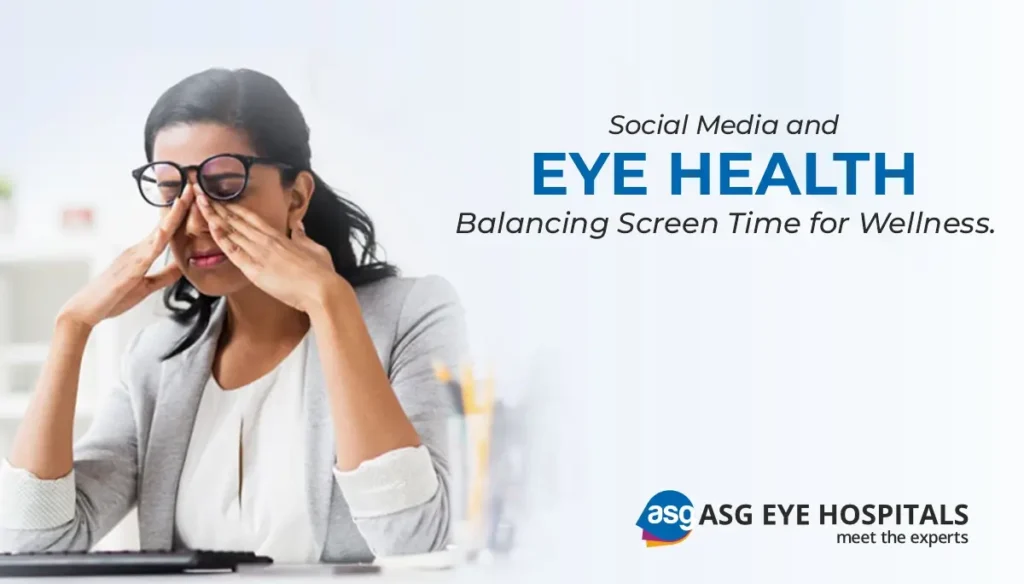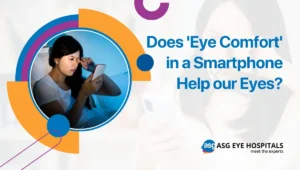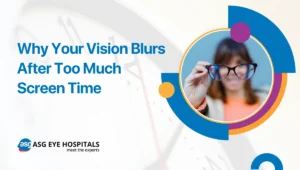In a highly technological age, our lives have become forever interconnected with the digital world. Screens are an essential component of our everyday lives, whether it is for work, play, socializing, or education. Social media and digital devices provide convenience and connectivity, but they also raise issues with our eyes’ health and screen time affects your eyes. It’s critical to balance screen time to protect our eyes and maintain our overall health.
The Digital Deluge and Eye Health
Our eyes are not designed for the long hours of screen exposure that many of us subject ourselves to daily. Staring at screens for extended periods can lead to digital eye strain, characterized by symptoms like dry eyes, headaches, blurred vision, and neck and shoulder pain. The blue light emitted by screens can disrupt our circadian rhythm (physical, mental, and behavioral changes that follow a 24-hour cycle), affecting our sleep patterns and overall well-being.
Social Media and the Eye Connection
Social media platforms, with their engaging content and scrolling mechanisms, often encourage prolonged screen use. The constant stream of notifications and the addictive nature of scrolling can make it challenging to disconnect. However, being aware of the affects of screen time on your eyes is the first step towards finding a balance.
Tips for Balancing Screen Time
- Follow the 20-20-20 Rule: Every 20 minutes, take a 20-second break and look at something 20 feet away. This simple practice helps reduce eye strain.
- Adjust Screen Settings: Optimize the brightness and contrast of your screen to reduce glare. Consider using blue light filters to minimize the impact of blue light on your eyes.
- Blink Often: Remember to blink regularly to keep your eyes moist. Staring at screens can reduce the frequency of blinking, leading to dry eyes.
- Mindful Social Media Use: Set time limits on your social media apps to avoid mindless scrolling. Allocate specific periods for social media use and stick to them.
- Digital Detox Days: Designate certain days or hours as digital detox periods. Use this time to engage in activities that don’t involve screens, promoting a healthier balance.
How Increased Screen Time Affects Your Eyes
Increased screen time has become an inevitable aspect of modern life, with many individuals spending prolonged hours on digital devices for work, education, and leisure. While technology has undeniably improved various aspects of our lives, the extended use of screens can have several effects on eye health. Here are some notable consequences of increased screen time on the eyes
- Digital Eye Strain (Computer Vision Syndrome): Prolonged exposure to screens can lead to digital eye strain, a condition also known as computer vision syndrome. This encompasses a range of eye discomfort and vision problems, including headaches, dry eyes, blurred vision, and neck and shoulder pain. The eyes are forced to work harder when focusing on digital content, leading to these symptoms.
- Blue Light Exposure: Digital screens emit a significant amount of blue light, which has a shorter wavelength and higher energy than other colors in the visible light spectrum. Continuous exposure to blue light, especially during the evening, can disrupt circadian rhythms, potentially affecting sleep patterns. This is because blue light suppresses melatonin production, the hormone responsible for regulating sleep.
- Reduced Blinking and Dry Eyes: When using screens, individuals tend to blink less frequently than normal. Reduced blinking can lead to dry eyes as the tear film, which keeps the eyes moist, evaporates more quickly. Dry eyes can cause discomfort, and a gritty sensation, and may even lead to inflammation if not addressed.
- Increased Myopia (Nearsightedness): Some studies suggest a correlation between increased screen time, particularly in children, and a higher incidence of myopia. Prolonged periods of near work, such as reading from screens, may contribute to the elongation of the eyeball, leading to Myopia (nearsightedness).
- Eye Fatigue and Discomfort: Staring at screens for extended periods can result in eye fatigue, characterized by a feeling of heaviness, tiredness, and discomfort. This fatigue can impact overall productivity and focus.
- Digital Distraction and Eye Coordination: The constant switching between different digital tasks, such as moving between tabs, can challenge eye coordination. This can contribute to eye strain and discomfort, particularly for individuals who spend a significant portion of their day multitasking on screens.
- Impact on Children’s Eye Development: Excessive screen time in children, whose eyes are still developing, may have long-term consequences. The American Academy of Pediatrics recommends limiting screen time for young children to maintain healthy eyes and overall well-being.
Prioritizing Eye Health in the Digital Age
Our eyes are precious, and taking proactive steps to care for them in the digital age is essential. By adopting healthy screen habits, we can enjoy the benefits of technology without compromising our eye health.
In a world where social media has become an integral part of our lives, finding the right balance is key. Whether it’s connecting with friends, staying informed, or entertaining ourselves, being mindful of our screen time can contribute significantly to our overall wellness.
Balancing screen time and adopting healthy habits, such as the 20-20-20 rule (taking a 20-second break to look at something 20 feet away every 20 minutes), can help mitigate these effects. Regular eye examinations are also crucial to detect and address any emerging issues promptly. As screens continue to be integral to our lives, maintaining awareness of these potential effects and taking proactive measures are essential for preserving eye health in the digital age.
So, let’s start a journey of conscious digital consumption. By incorporating these simple tips into our daily lives, we can navigate the digital landscape while prioritizing the well-being of our eyes. After all, the world is beautiful, and it’s meant to be seen through healthy eyes.




